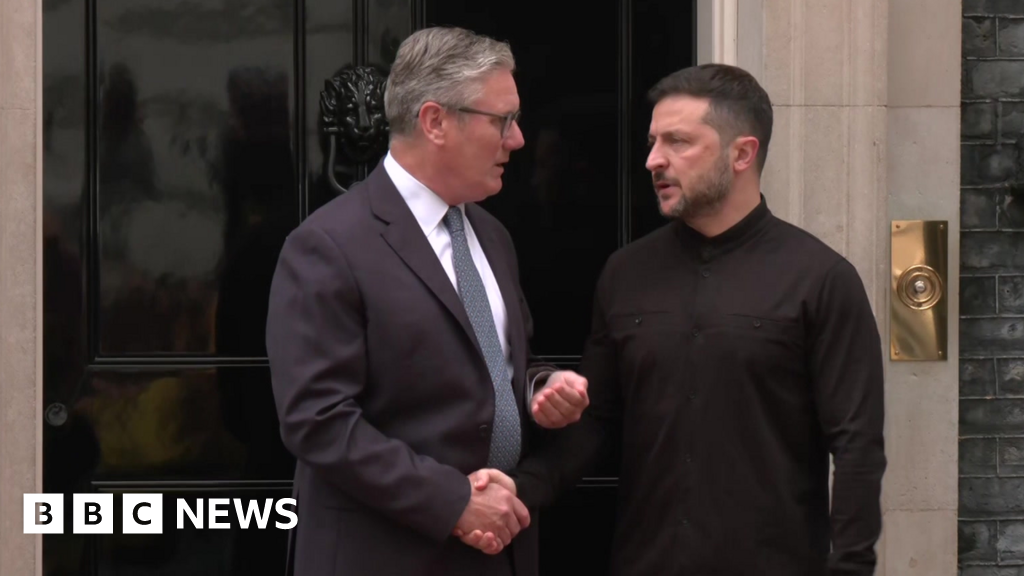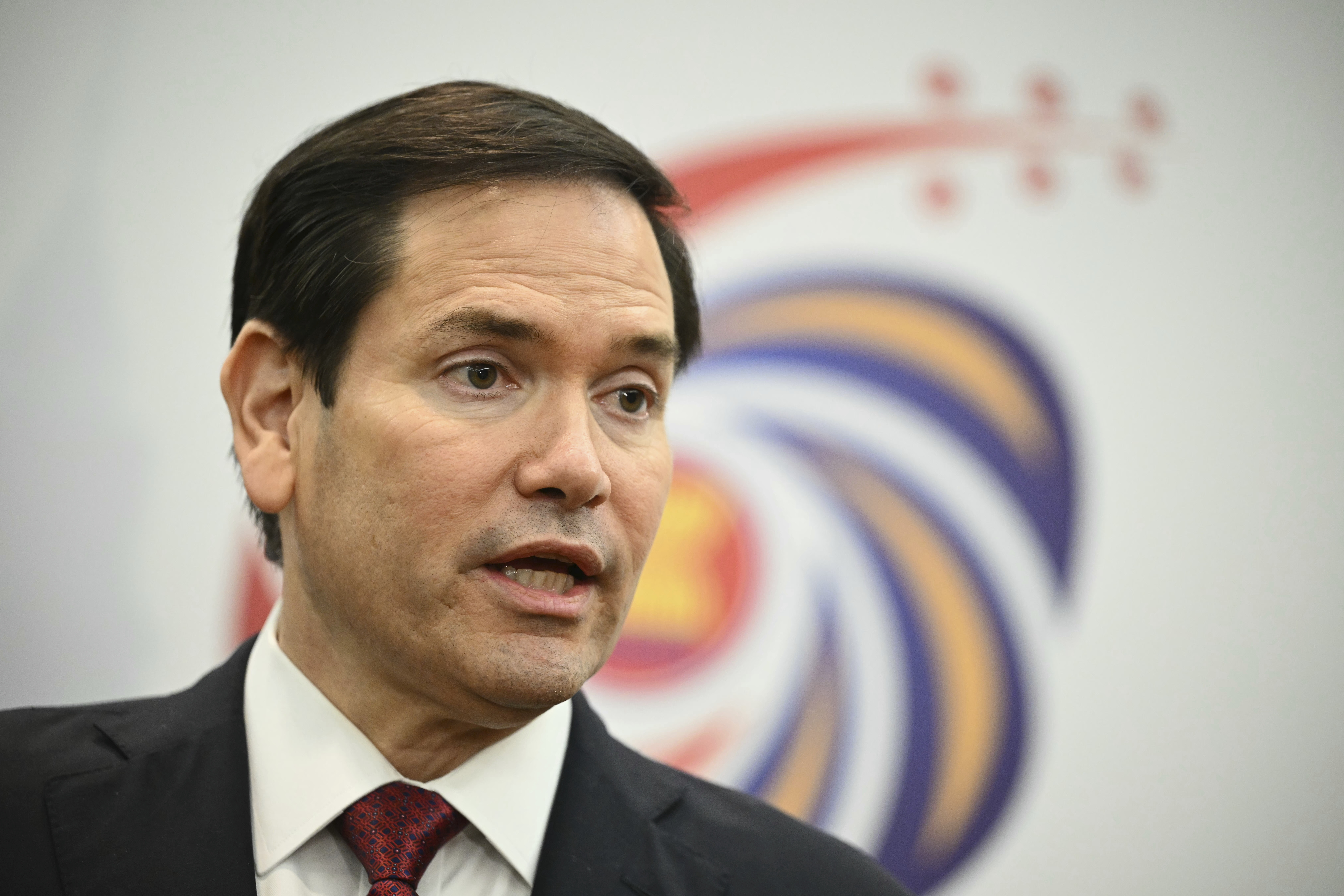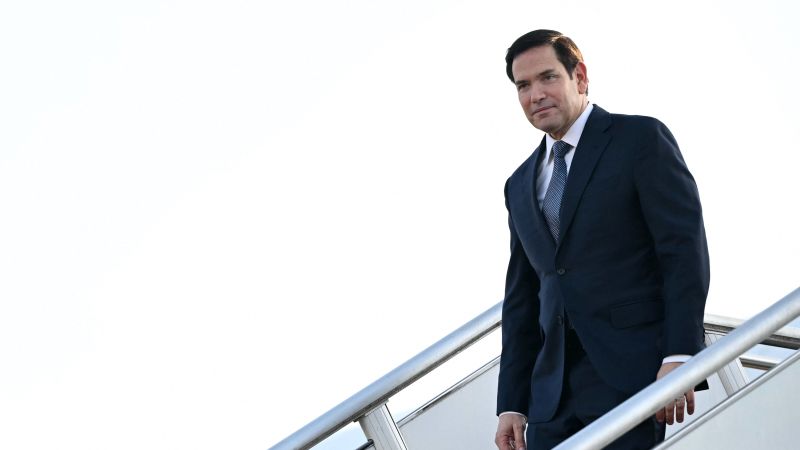Possible Ceasefire in Ukraine as Zelensky Visits UK

Introduction
As Ukrainian President Volodymyr Zelensky visits London, UK Prime Minister Keir Starmer sees a viable chance for a ceasefire in the ongoing conflict in Ukraine. This comes as European leaders gather ahead of the highly anticipated summit between US President Donald Trump and Russian President Vladimir Putin on Friday. The situation in Ukraine has been a major point of discussion in recent international meetings, with tensions between Russia and the West at an all-time high.
Key Details
Zelensky's visit to London comes as part of his efforts to garner support for a peaceful resolution to the conflict in Ukraine. The country has been embroiled in a war with Russian-backed separatists in the eastern regions of Donetsk and Luhansk since 2014. The UK has been a vocal supporter of Ukraine's sovereignty and territorial integrity, and Starmer's acknowledgement of a possible ceasefire is a positive sign for the country. This comes after months of escalating violence and tensions in the region.
Impact
The possibility of a ceasefire is a much-needed relief for the people of Ukraine, who have been living in a state of constant fear and uncertainty for years. It also reflects a potential shift in the relationship between Russia and the West, as Trump and Putin prepare to meet for the first time since the 2018 Helsinki Summit. With the UK showing its support for a peaceful
About the People Mentioned
Volodymyr Zelensky
Volodymyr Zelensky is a Ukrainian politician and former comedian who was born on January 25, 1978, in Kryvyi Rih, Ukraine. Prior to his political career, he gained fame as an actor and comedian, notably for his role in the TV series "Servant of the People," where he portrayed a teacher who becomes president. This role ironically foreshadowed his future as the sixth president of Ukraine, a position he assumed on May 20, 2019, after winning the presidential election on April 21, 2019[1][2][4]. Zelensky's presidency has been marked by significant challenges, including the COVID-19 pandemic and escalating tensions with Russia. His leadership during these crises has been notable, particularly his response to the Russian invasion of Ukraine in February 2022. He became an international symbol of resistance, refusing evacuation offers and rallying global support for Ukraine. Under his leadership, Ukraine has received substantial international military and financial aid[1][3]. One of Zelensky's key achievements is his ability to unite Ukrainians and communicate effectively with the international community. His presidency has been recognized globally, with Time Magazine naming him Person of the Year in 2022 for his leadership during the Russian invasion[1][3]. Despite lacking prior political experience, Zelensky has demonstrated resilience and strategic communication skills, which have been crucial in navigating Ukraine through its most challenging moments. Currently, Zelensky remains a central figure in international politics, especially in the context of the ongoing conflict with Russia. His commitment to defending Ukraine's sovereignty has garnered widespread support, both domestically and internationally. Zelensky is married to Olena Zelenska and has two children, balancing his public duties with family life[1][4].
Keir Starmer
Keir Starmer, born on September 2, 1962, in London, England, is a British politician and barrister. He grew up in Oxted, Surrey, with his father working as a toolmaker and his mother as an NHS nurse. Starmer was the first in his family to attend university, studying law at the University of Leeds and later earning a postgraduate degree from the University of Oxford[2][3]. Before entering politics, Starmer had a distinguished career as a barrister. He qualified in 1987 and was appointed Queen's Counsel (QC) in 2002. Notably, he served as the Director of Public Prosecutions from 2008 to 2013, leading the Crown Prosecution Service[2]. He was knighted in 2014 for his contributions to criminal justice[2]. Starmer was elected as a Member of Parliament for Holborn and St Pancras in 2015. He became the Shadow Minister for Immigration under Jeremy Corbyn but later resigned in protest. He then served as Shadow Secretary of State for Exiting the European Union[5]. In April 2020, he was elected as the leader of the Labour Party, winning with a significant majority in the first round of voting[5]. In July 2024, Starmer became the Prime Minister of the United Kingdom following a landslide Labour victory in the general election, replacing Rishi Sunak[1][4]. As Prime Minister, he is focused on implementing Labour's manifesto, which includes objectives related to the economy, crime, healthcare, education, and climate change[1]. His leadership marks a significant shift in British politics, emphasizing national renewal and change[4]. Starmer is married to Victoria Starmer, an NHS worker, and they have two children[4].
Donald Trump
Donald John Trump, born June 14, 1946, in Queens, New York, is an American businessman, media personality, and politician. He graduated from the University of Pennsylvania’s Wharton School in 1968 with a degree in economics. In 1971, he took over his family’s real estate business, renaming it the Trump Organization, through which he expanded into building and managing skyscrapers, hotels, casinos, and golf courses. Trump gained widespread fame as the host of the reality TV show *The Apprentice* from 2004 to 2015, which helped establish his public persona as a successful entrepreneur. Trump entered politics as a Republican and was elected the 45th president of the United States, serving from 2017 to 2021. His presidency was marked by significant policy actions including tax cuts, deregulation, the appointment of three Supreme Court justices, renegotiation of trade agreements (notably replacing NAFTA with the USMCA), and a focus on immigration control including border wall expansion. He withdrew the U.S. from international agreements such as the Paris Climate Accord and the Iran nuclear deal, and engaged in a trade war with China. His administration’s response to the COVID-19 pandemic was criticized for downplaying the virus’s severity. Trump was impeached twice by the House of Representatives—first in 2019 for abuse of power and obstruction, and again in 2021 for incitement of insurrection—but was acquitted by the Senate both times. After losing the 2020 election to Joe Biden, Trump challenged the results, culminating in the January 6, 2021, Capitol riot. He remains a central figure in American politics, having won the 2024 presidential election and returned as the 47th president in 2025, continuing to promote policies aimed at economic growth, border security, and military strength[1][2][3][4].
Vladimir Putin
Vladimir Putin is the current President of Russia, a position he has held for multiple terms since 2000, with a brief interlude as Prime Minister from 2008 to 2012[1][3]. Born in Leningrad (now Saint Petersburg) in 1952, Putin began his career in the Soviet Union’s security services, joining the KGB in 1975 and rising to the rank of Lieutenant Colonel by the time he left in 1991, following postings in East Germany and Leningrad[4]. After the Soviet Union’s collapse, he transitioned into politics, serving as an adviser to Saint Petersburg Mayor Anatoly Sobchak and later moving to Moscow, where he held various administrative roles under President Boris Yeltsin[6]. Putin was appointed Prime Minister in August 1999 and became acting President when Yeltsin unexpectedly resigned that December[3][6]. He won his first presidential election in March 2000, promising to stabilize Russia’s economy and political system after the tumultuous 1990s[3][7]. During his initial terms, he centralized power, reasserted federal control over Russia’s regions, and curtailed the influence of the country’s oligarchs through legal and economic measures[7]. Putin was re-elected in 2004 but, due to constitutional term limits, stepped aside in 2008, becoming Prime Minister under his successor Dmitry Medvedev, while retaining significant influence[3]. Constitutional amendments later extended presidential terms, and Putin returned to the presidency in 2012[1]. Putin’s time in office has been marked by assertive foreign policy, including military interventions in Syria in support of President Bashar al-Assad and the 2014 annexation of Crimea, which led to international sanctions[1]. Domestically, his tenure has seen increased state control over media, the suppression of political opposition, and constitutional changes consolidating executive authority[1]. In 2022, Russia’s full-scale invasion of Ukraine triggered a major international crisis, further isolating Russia from the West and prompting widespread condemnation[1]. As of 2025, Putin remains a dominant figure in Russian politics, having secured another term in office through constitutional changes that allow him to potentially remain president until 2036[1]. His leadership continues to shape Russia’s domestic trajectory and its role in global affairs, amid ongoing conflict in Ukraine and strained relations with NATO and Western countries[1].
About the Organizations Mentioned
European leaders
It seems there might be confusion in the query as there isn't a prominent organization specifically named "European Leaders." However, I'll provide a summary about the **European Leadership Network (ELN)**, which is a notable organization related to European leadership in security and foreign policy. ## European Leadership Network (ELN) The European Leadership Network (ELN) is a pan-European think-tank focused on European foreign, defense, and security issues. Founded in 2011, it aims to build better security for a wider Europe by addressing the gravest risks to European security through research, publications, and policy advocacy[1][2]. ### History and Objectives The ELN was initially part of the Nuclear Security Project, aiming to create a dialogue on nuclear disarmament. Over time, its scope expanded to address broader European security challenges, including the loss of cohesion among states, unintended war risks, and new military technologies[1][2]. ### Key Achievements - **Nuclear Security**: The ELN's work has been recognized with prestigious awards, such as the Nunn-Lugar Award for Promoting Nuclear Security, received by former UK Defence Secretary Des Browne and former Russian Foreign Minister Igor Ivanov[2]. - **Policy Impact**: The ELN influences European security policy through its networks of leaders and partnerships across Europe and beyond[1][2]. ### Current Status As of 2025, the ELN was declared an undesirable organization in Russia, reflecting its impactful role in European security discussions[2]. Despite this, the ELN continues to engage with European leaders on critical security issues. ### Notable Aspects - **Networking**: The ELN's strength lies in its network of over 450 current, past, and future European leaders across various sectors[1]. - **Global Partnerships**: The ELN collaborates with institutions in North America, Latin America, and the Asia-Pacific region, enhancing its global influence[1]. While the ELN is not directly involved
US President
The "US President" refers to the office of the President of the United States, the head of the executive branch of the federal government and Commander-in-Chief of the U.S. military. Established by Article II of the U.S. Constitution, the presidency holds significant authority including enforcing federal laws, appointing federal officials, conducting foreign policy, and directing the military[1][4]. The president also plays a critical role in domestic policymaking and legislation by signing or vetoing bills passed by Congress[1][4]. The office was created to unite leadership and ensure the execution of laws with executive power vested solely in the president. Since the first president, George Washington, 47 presidencies have occurred, with 45 individuals serving in the role. Presidents are elected indirectly through the Electoral College to serve four-year terms, limited to two terms by the Twenty-second Amendment ratified in 1951[1]. The current president is Donald Trump, inaugurated for his term beginning January 20, 2025[1]. Key responsibilities include acting as the nation's chief diplomat, commander of the armed forces, and head of state symbolizing national unity. The president influences legislation by proposing policy agendas, issuing executive orders, and shaping public opinion through direct communication with the public using modern media tools[3][5][6]. The office requires a blend of formal constitutional powers and informal leadership skills to unify the country and represent its interests domestically and internationally[3]. Notable achievements of presidents span military leadership during wars, landmark legislation, and influential rhetoric shaping American values and policy. Examples include leadership during World War II, the New Deal reforms, and civil rights advancements. The role continues to evolve with technology and changing global dynamics, maintaining the president as one of the most powerful and visible figures in government and international affairs[5][3]. In summary, the US presidency is a complex institution central to American governance, combining legal authority, political leadership, and symbolic representation, with profound impact on both domesti
Russian President
The Russian President, as an institution, is central to the country's political system, with Vladimir Putin being the most prominent figure in this role. The Presidential Executive Office supports the President's work, playing a crucial role in drafting legislation, decrees, and other key documents. It monitors the implementation of federal laws and presidential directives, ensuring these are enforced effectively across the country[1][3]. ### History and Evolution Historically, the Russian presidency has grown in power, especially under Putin's leadership. Putin has consolidated power, appointing loyalists to key positions and reshaping the political landscape to maintain control[9][10]. Recent years have seen significant changes, including the reorganization of power structures and the appointment of new officials to key roles[2]. ### Key Achievements - **Legislative Influence**: The Presidential Executive Office has been instrumental in shaping Russia's legal framework by drafting and submitting legislation to the State Duma[1]. - **Policy Implementation**: It ensures that presidential decrees and orders are enforced, maintaining stability and continuity in governance[1]. - **International Engagement**: The office facilitates interactions with foreign governments and international organizations, projecting Russia's diplomatic presence[1]. ### Current Status Currently, Putin's regime is undergoing a managed transition, with the President maintaining control while delegating day-to-day governance to the State Council. This transition involves significant personnel changes, aiming to secure loyalty and obedience among officials[2]. ### Notable Aspects - **Centralized Power**: The Russian political system is highly centralized, with the President holding significant authority[8]. - **Elite Dynamics**: The Russian elite is divided into groups, including technocrats and protectors, each playing distinct roles in shaping policy[4]. - **Generational Shifts**: There is a noticeable shift towards younger bureaucrats and loyal cohorts, influencing the future trajectory of the regime[2][4]. Overall, the Russian Presidency is a powerful institution at the heart of the country's governance, with













